fA food and nutrition theme is a great way to teach healthy eating to kids! This vegetable garden playdough invitation to play is not only a fun way to incorporate some math into your food theme, but also a non-imposing way to teach children about vegetables!
Teach Healthy Eating to Kids with This Math Activity Using Playdough
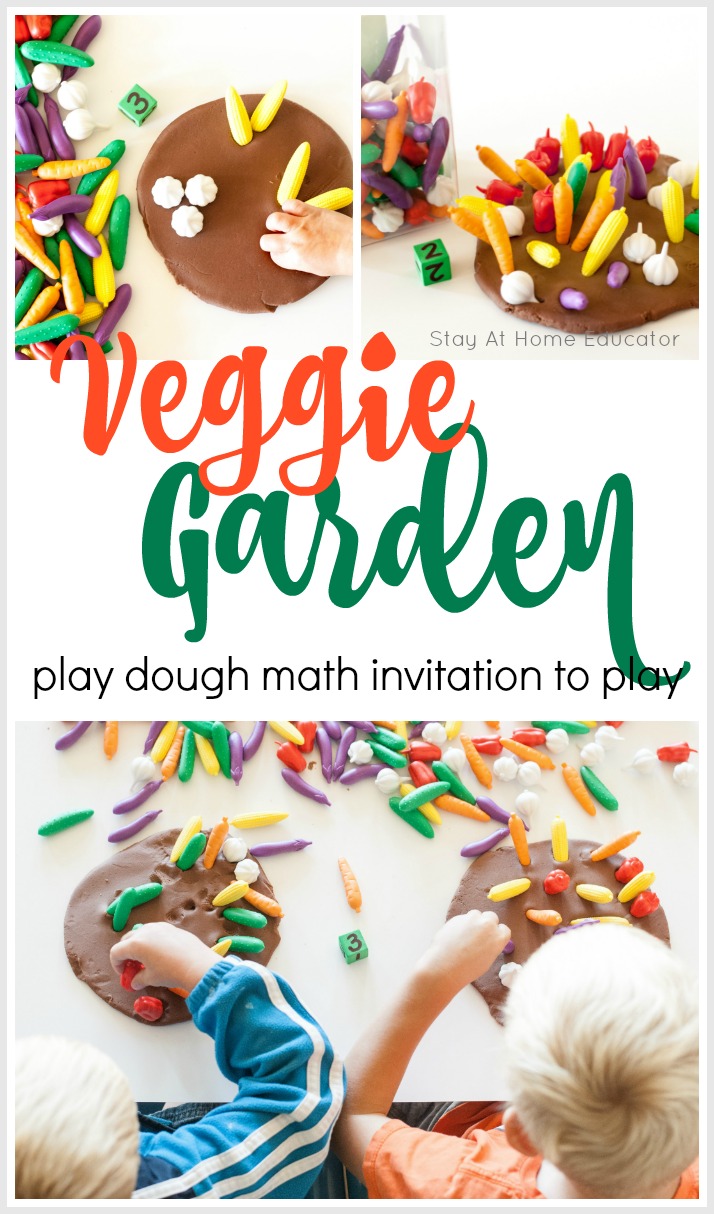
I have two preschool classes of eight students each, and then five kids of my own. Trust me when I say that I understand the pain and suffering of an adult trying to teach healthy eating to kids.
Kids are naturally picky. Not just in eating, but everything. It’s part of their development as they process what it means for them to gain independence and to make their own choices.
Kids are also stubborn and strong-willed. Again, part of their development…and maybe part of their cute little personalities, too. (Wink, wink).
My point is, I get it.
But it’s so important to teach children healthy eating habits while they are young! (I’ve mentioned this before in this post). And a food and nutrition activity like this one totally fits the bill for teaching healthy eating.
In full disclosure, children may still push away their plate of sliced red peppers and hummus, but research shows that the more exposure children have to a food the more likely they are to try it.
So why not take that level of exposure to a new level with a veggie garden play dough math invitation to play?!
Playdough Math Invitation to Play to Teach Healthy Eating to Kids
My favorite part of this healthy eating activity is that it’s crazy fast and simple to set-up. As in, a matter of minutes.
And the learning outcomes are many for such a quick set-up.
Materials
- Vegetable counters (You can get fruit counters, too!)
- Dice
- brown playdough or peanut butter playdough recipe
The Set-up
Pour out the vegetable counters onto a tray, or in a long line on the table. Give each child a chunk of playdough. (Did I mention we colored this playdough with cocoa powder? You can read about it here.)
Finally, set out the dice and invite your preschooler to join you for some healthy eating math fun!
The Healthy Eating Playdough Invitation to Play
These vegetable counters were new to my kids, and the first thing I do when offering them something new to explore in a directed activity is to allow them time to just play. To manipulate and explore the materials on their own.
Don’t skip this step. Often, I find, it inspires some of the best and most effective activities in my preschool.
The math activity is simple. Invite your preschooler to roll the dice and identify the number. I like to use a dice with numerals so my preschoolers can practice number identification, but you can use a dice with pips, too. Using a dice with pips will allow your preschooler to not only practice more one-to-one correspondence but also subitizing. (Subitizing is the ability to automatically recognize quantities. I’ve written about why it’s an important number sense skill here).
So, roll the dice and identify the number. Then your preschooler will count out the corresponding number of vegetable counters and “plant” them (push them) into the play dough.
Here’s the catch though…
The preschooler must select one kind of vegetable to plant with each roll. So, if the number five is rolled, then the preschooler must select five of one kind of vegetable counter. Five red peppers, or five ears of corn, or five eggplant. The next time the dice is rolled, then another kind of vegetable can be planted, or more of the same.
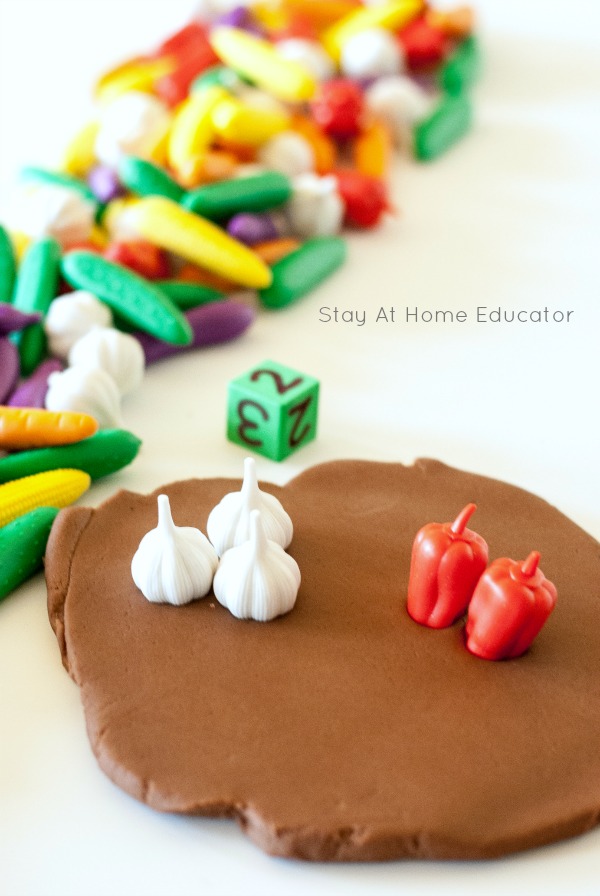
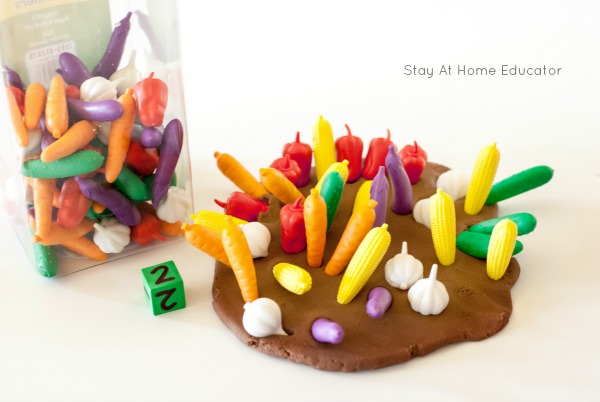
But look at this play!

This kind of play is the work of preschoolers! And I assure you this is such a fun way to teach healthy eating to kids!
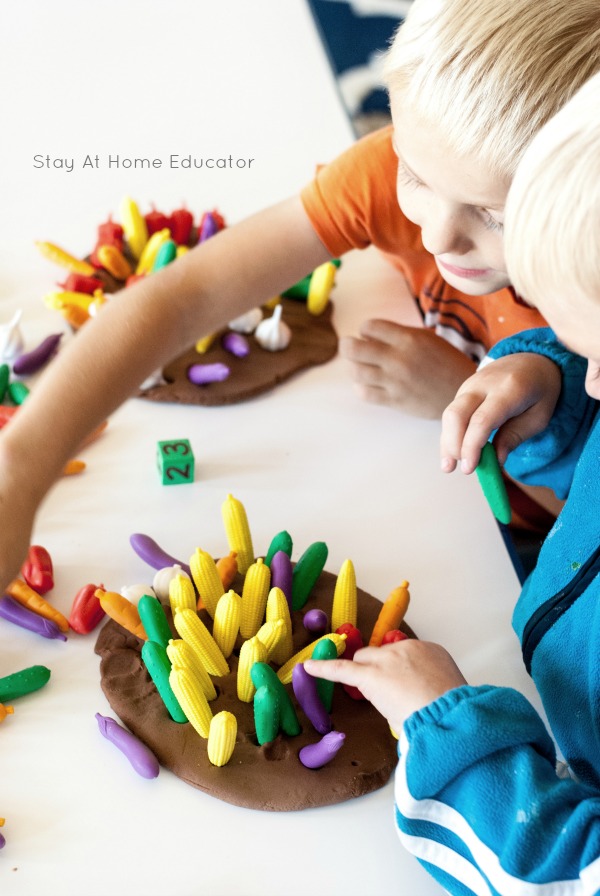
But let’s talk about how we can extend this activity to really teaching healthy eating to kids!
Questions to Ask to Teach Healthy Eating to Kids
Any preschool activity is only as good as the conversations you engage the children in. Yes, children can learn very well without interference from an adult, and you should certainly use their natural conversations as a way to guide your own questions and dialogue starters.
But here are some ideas for how to teach healthy eating to kids with this play dough activity.
- What vegetable is this? It is the color _____ ? What does it feel like?
- Have you ever tried _____? I like to eat it in _____. Have you ever eaten _____?
- Why did you choose ______ to plant? How do you like to eat it?
- Have you ever seen a _____ field? Have you ever seen this vegetable in the store? What about at home?
- What do you think this tastes like? I think it tastes _____ (sweet, grainy, crunchy, etc).
- I like the color of this vegetable. What other foods are _____?
Your preschoolers will of course inspire the best conversations to have during the invitation to play. The key is to engage them in language. Rich, informative, and academically appropriate for preschoolers. (You can read about other easy ways to develop language in preschooler here and here).
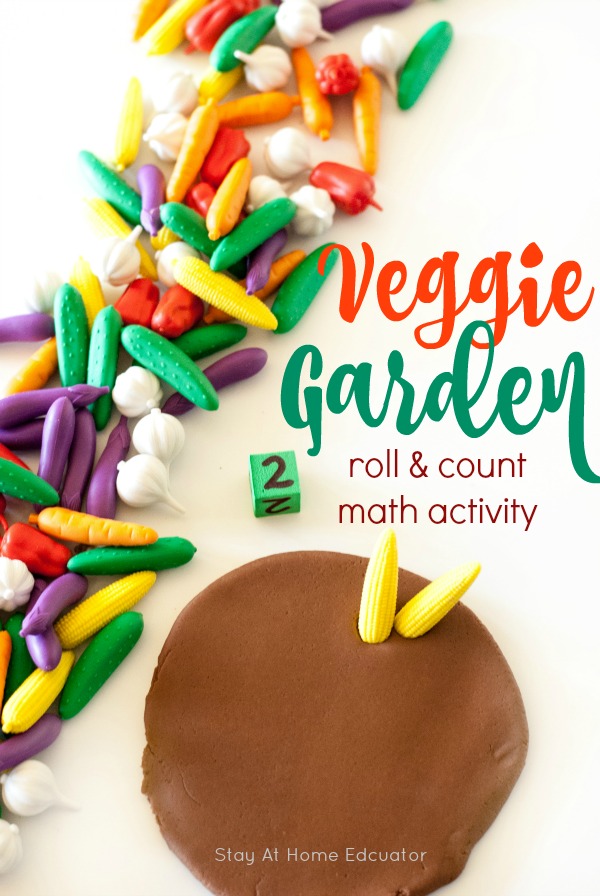
Looking for More Food and Nutrition Activities?
I’ve got a bunch for you! Try some of these and be sure to grab the free printable that are included!
Want More Food and Nutrition Printables?
I made this activity pack to compliment my preschool centers. But they are fantastic for small groups, circle time, and even independent practice if you are a homeschooling parent.
Join our community!


I’m Sarah, an educator turned stay-at-home-mama of five! I’m the owner and creator of Stay At Home Educator, a website about intentional teaching and purposeful learning in the early childhood years. I’ve taught a range of levels, from preschool to college and a little bit of everything in between. Right now my focus is teaching my children and running a preschool from my home. Credentials include: Bachelors in Art, Masters in Curriculum and Instruction.
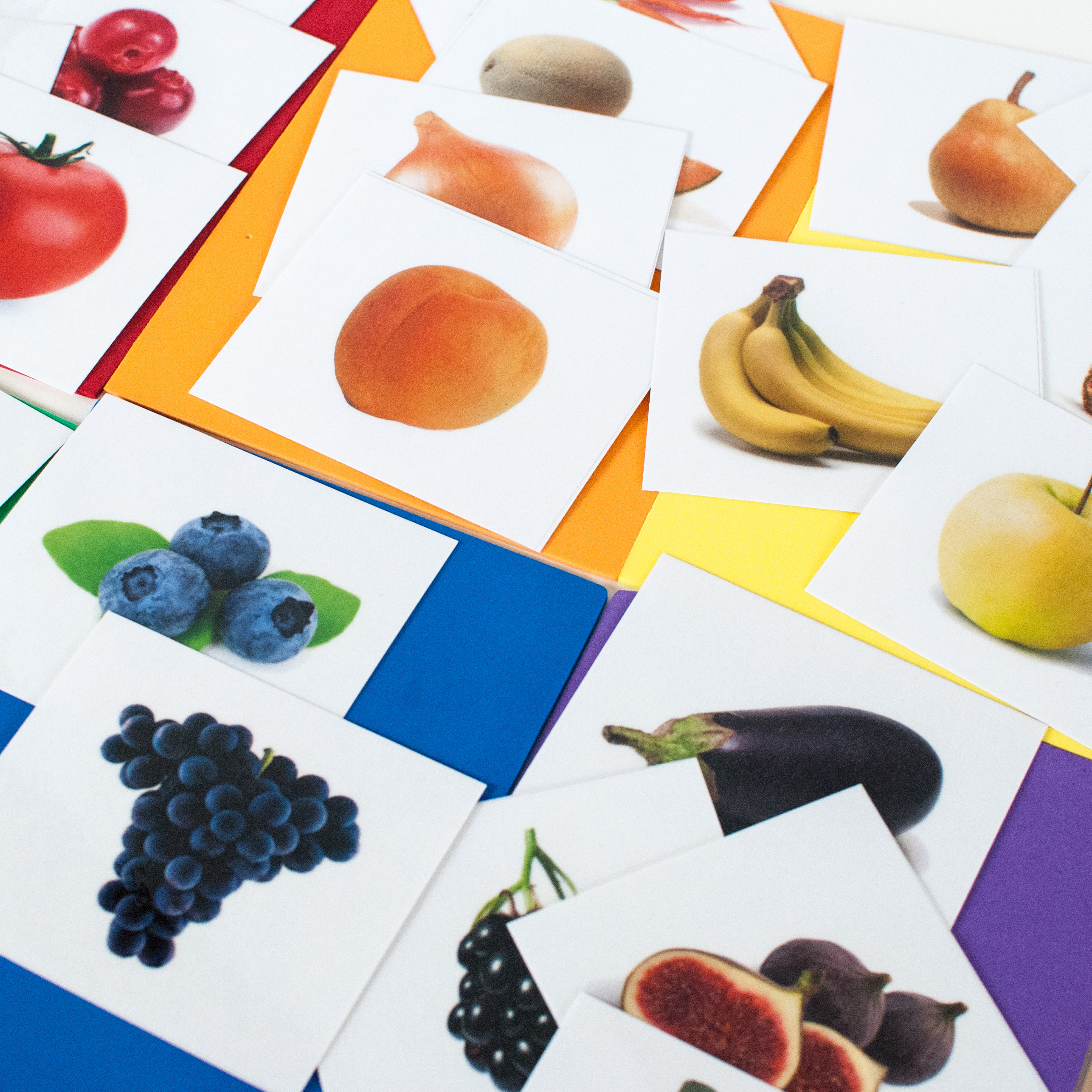
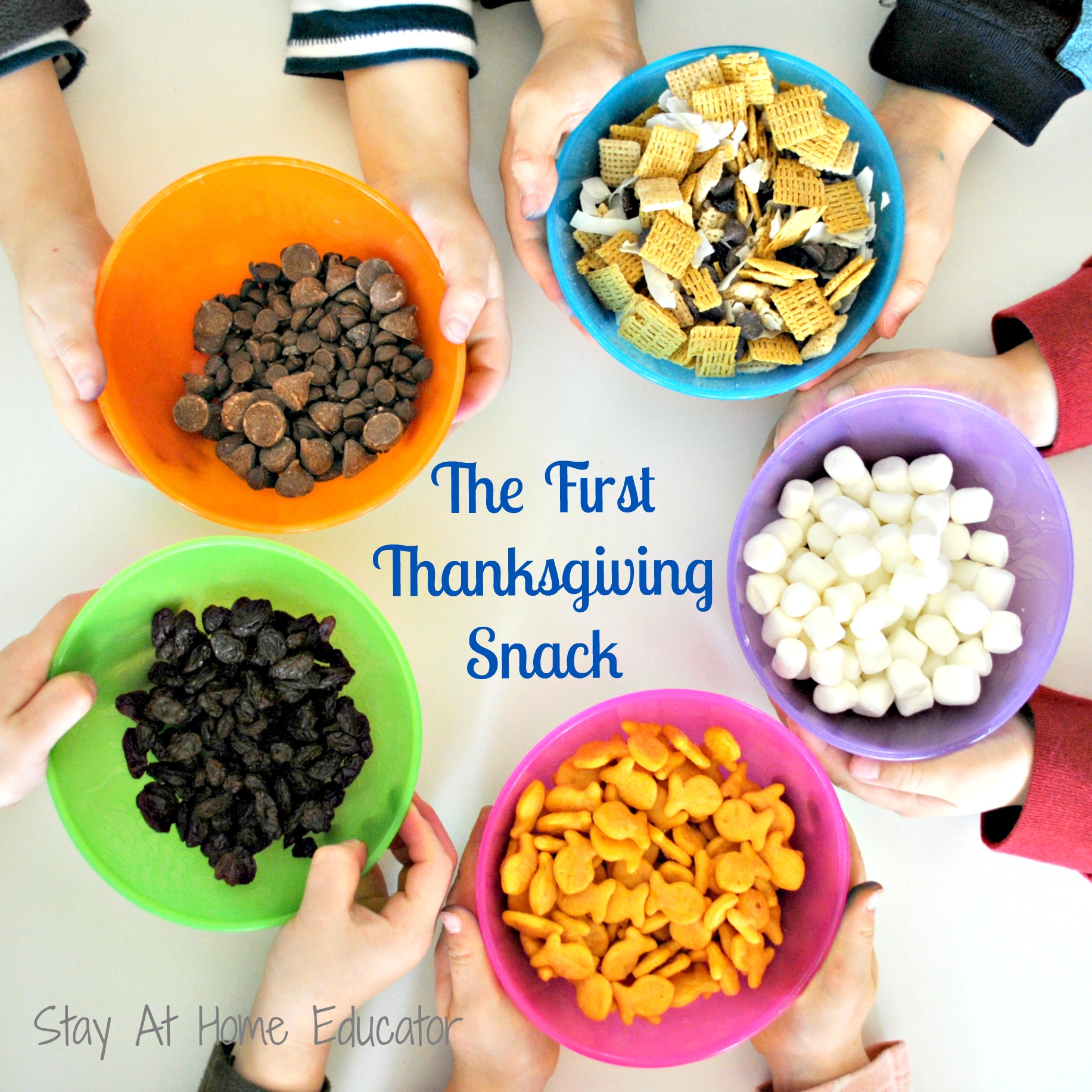
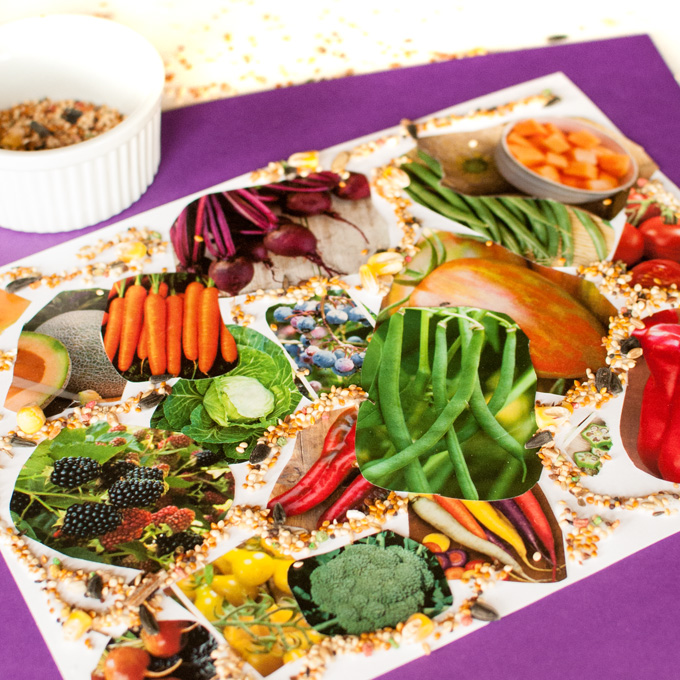
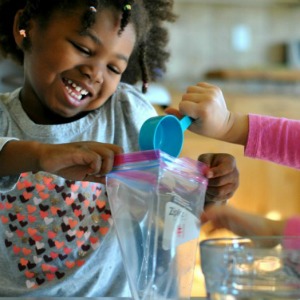
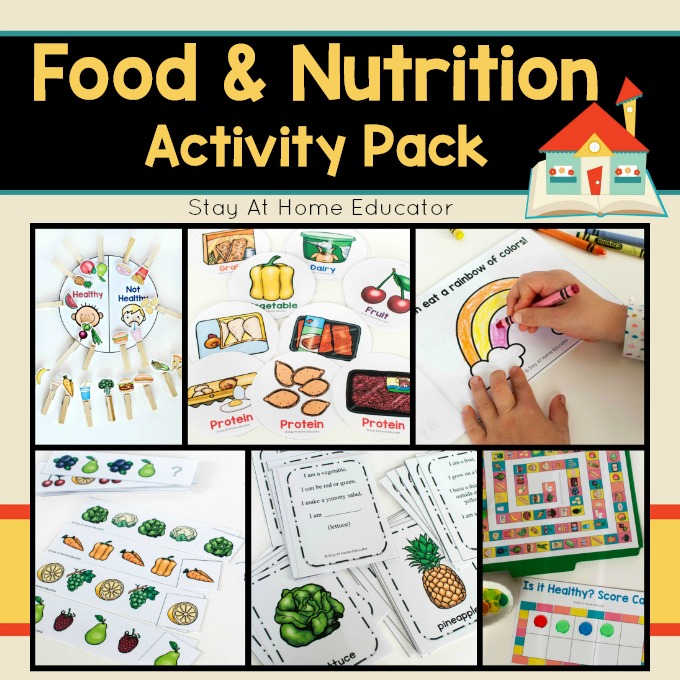

[…] So, it’s kinda’ a family thing and my kid’s favorite refreshment in the summer is absolutely, hands-on, without debate…you got it…lemonade. […]